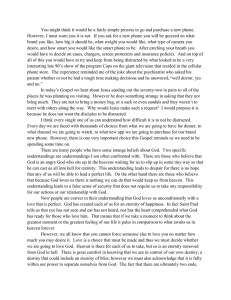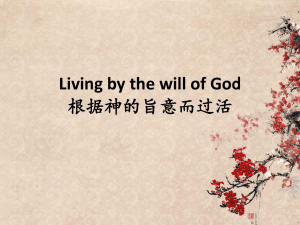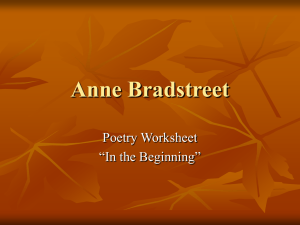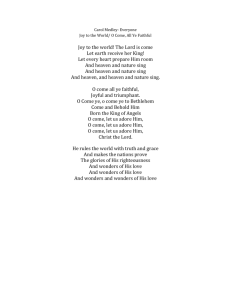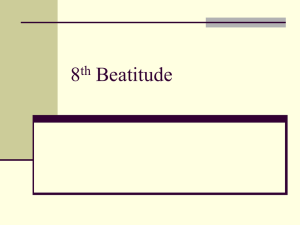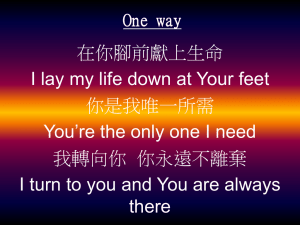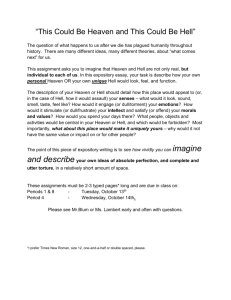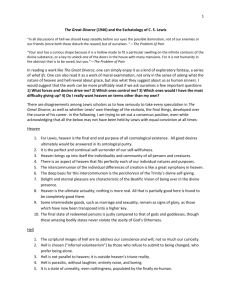The Great Divorce 11-14
advertisement
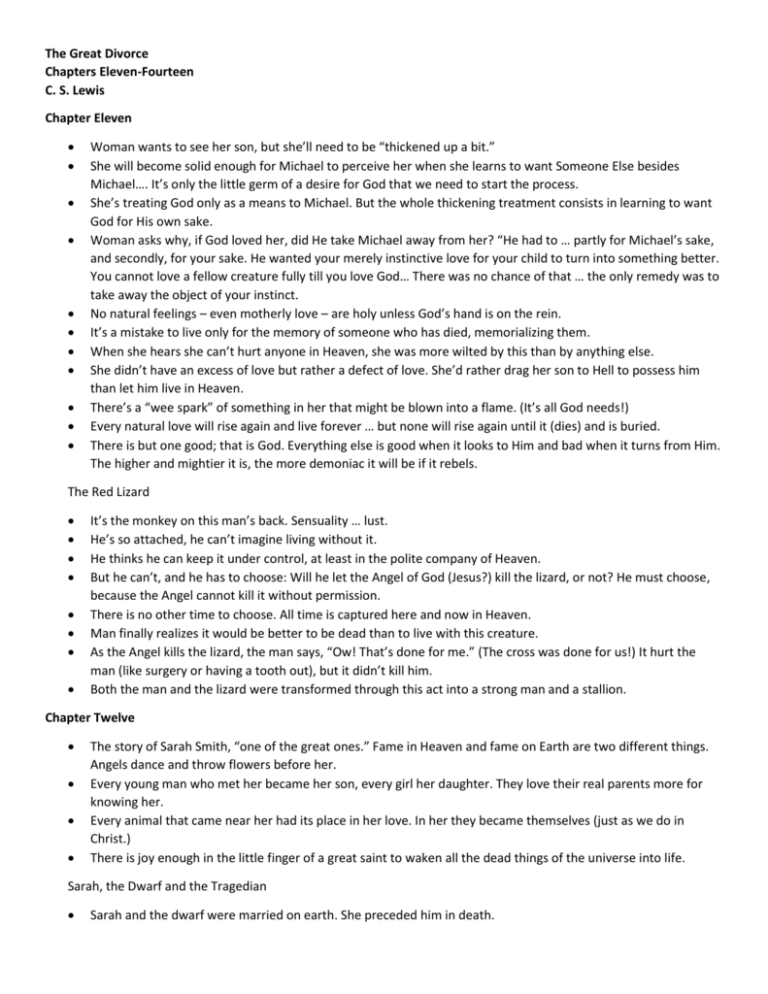
The Great Divorce Chapters Eleven-Fourteen C. S. Lewis Chapter Eleven Woman wants to see her son, but she’ll need to be “thickened up a bit.” She will become solid enough for Michael to perceive her when she learns to want Someone Else besides Michael…. It’s only the little germ of a desire for God that we need to start the process. She’s treating God only as a means to Michael. But the whole thickening treatment consists in learning to want God for His own sake. Woman asks why, if God loved her, did He take Michael away from her? “He had to … partly for Michael’s sake, and secondly, for your sake. He wanted your merely instinctive love for your child to turn into something better. You cannot love a fellow creature fully till you love God… There was no chance of that … the only remedy was to take away the object of your instinct. No natural feelings – even motherly love – are holy unless God’s hand is on the rein. It’s a mistake to live only for the memory of someone who has died, memorializing them. When she hears she can’t hurt anyone in Heaven, she was more wilted by this than by anything else. She didn’t have an excess of love but rather a defect of love. She’d rather drag her son to Hell to possess him than let him live in Heaven. There’s a “wee spark” of something in her that might be blown into a flame. (It’s all God needs!) Every natural love will rise again and live forever … but none will rise again until it (dies) and is buried. There is but one good; that is God. Everything else is good when it looks to Him and bad when it turns from Him. The higher and mightier it is, the more demoniac it will be if it rebels. The Red Lizard It’s the monkey on this man’s back. Sensuality … lust. He’s so attached, he can’t imagine living without it. He thinks he can keep it under control, at least in the polite company of Heaven. But he can’t, and he has to choose: Will he let the Angel of God (Jesus?) kill the lizard, or not? He must choose, because the Angel cannot kill it without permission. There is no other time to choose. All time is captured here and now in Heaven. Man finally realizes it would be better to be dead than to live with this creature. As the Angel kills the lizard, the man says, “Ow! That’s done for me.” (The cross was done for us!) It hurt the man (like surgery or having a tooth out), but it didn’t kill him. Both the man and the lizard were transformed through this act into a strong man and a stallion. Chapter Twelve The story of Sarah Smith, “one of the great ones.” Fame in Heaven and fame on Earth are two different things. Angels dance and throw flowers before her. Every young man who met her became her son, every girl her daughter. They love their real parents more for knowing her. Every animal that came near her had its place in her love. In her they became themselves (just as we do in Christ.) There is joy enough in the little finger of a great saint to waken all the dead things of the universe into life. Sarah, the Dwarf and the Tragedian Sarah and the dwarf were married on earth. She preceded him in death. The tragedian is the mask/alter ego for the dwarf, wanting to know he’s been missed and she’s been miserable by being apart from him. The tragedian is actually taking over the dwarf, it’s been around so long. “Didn’t you want me to be happy?” she asks. “But no matter. Want it now. Or don’t think about it at all.” “Didn’t you love me down there” he asks. She replies, “What we called love down there was mostly the craving to be loved. Mainly I loved you for my own sake, because I needed you.” She has no needs now and so can begin to love him truly. Chapter 13 The tragedian (seeking pity) gets melodramatic. (Frank disappears within him.) I can see where I’m not needed … I have self-respect … It’s nothing to you that I go back to the cold and the gloom, the lonely streets … Pity can be used for blackmailing, to get people to give in or give over things they normally wouldn’t. Doesn’t work in Heaven. Joy is not created to be blackmailed by pity. The light of Heaven can swallow up Frank’s darkness, but his darkness cannot infect Heaven’s light. Love and joy will not always be at the mercy of frowns and sighs. “You do not love me,” the tragedian says. “I cannot love a lie,” she responds. “I cannot love the thing which is not. I am in Love, and out of it I will not go.” Hell is not given the power to veto Heaven. The action of Pity will live forever; the passion of Pity will not. The passion draws people to concede what should not be conceded and to flatter when they should speak the truth. The action leaps from the highest place to the lowest to bring healing and joy, whatever the cost to itself. (The work of Jesus.) Hell is infinitesimally small. Only One had the power to make Himself small enough to descend into Hell. Predestination or universalism? Any answers we might come up with now are deceiving. Any attempt to see the shape of eternity except through the lens of time destroys our knowledge of Freedom, which is the gift we have that makes us most resemble our Maker. “The Lord said we were gods. How long could ye bear to look, without the lens of Time, on the greatness of your own soul and the eternal reality of her choice?” (Be serious about this topic and about the choice you must make. That’s the gift and the responsibility that’s been given to you. Don’t speculate on predestination and universalism. Tend to the task and the choice at hand.) Chapter Fourteen The chess game. Giants are watching the game in silence. Each chessman represents those who were watching. The giants are the souls of the pieces on the board as they play out their moves and make their decisions within the boundaries of Time, the silver table. (Time gives definition and meaning to our life; it’s the only frame of reference we have. It shields us from eternity, which we’re not yet equipped to experience. Use time well, yield to God here, and we will be prepared for a glorious eternity.) The Narrator asks whether the conversations he heard between the Spirits and the Ghosts are really only reflecting choices that had been made long ago? Or, MacDonald says, you could say they anticipate choices that will be made later. But better to say neither. You saw choices being made more clearly than you could see them on Earth because the lens (of Time) was clearer. But you still saw it through the lens. Make sure people you tell this to understand it was only a dream. Don’t pretend you’re claiming knowledge that no mortal has. The Great Divorce is not about what life is like on the other side. It’s about taking seriously the need to let go of yourself and your sins so God can fill you with new, eternal life. It’s a clear look at the nature of sin in many of its forms, and it’s a glimpse of how empty and hopeless Hell will be and how glorious Heaven will be.
